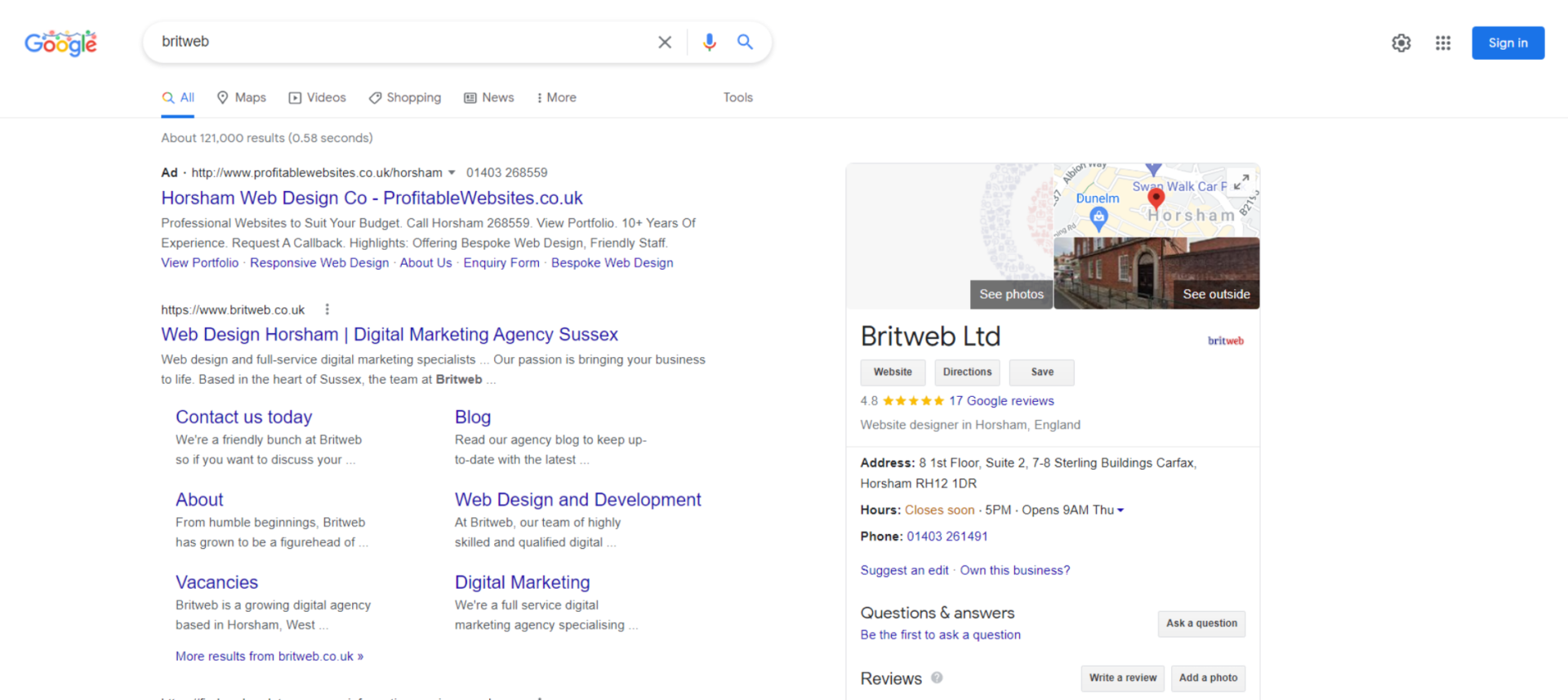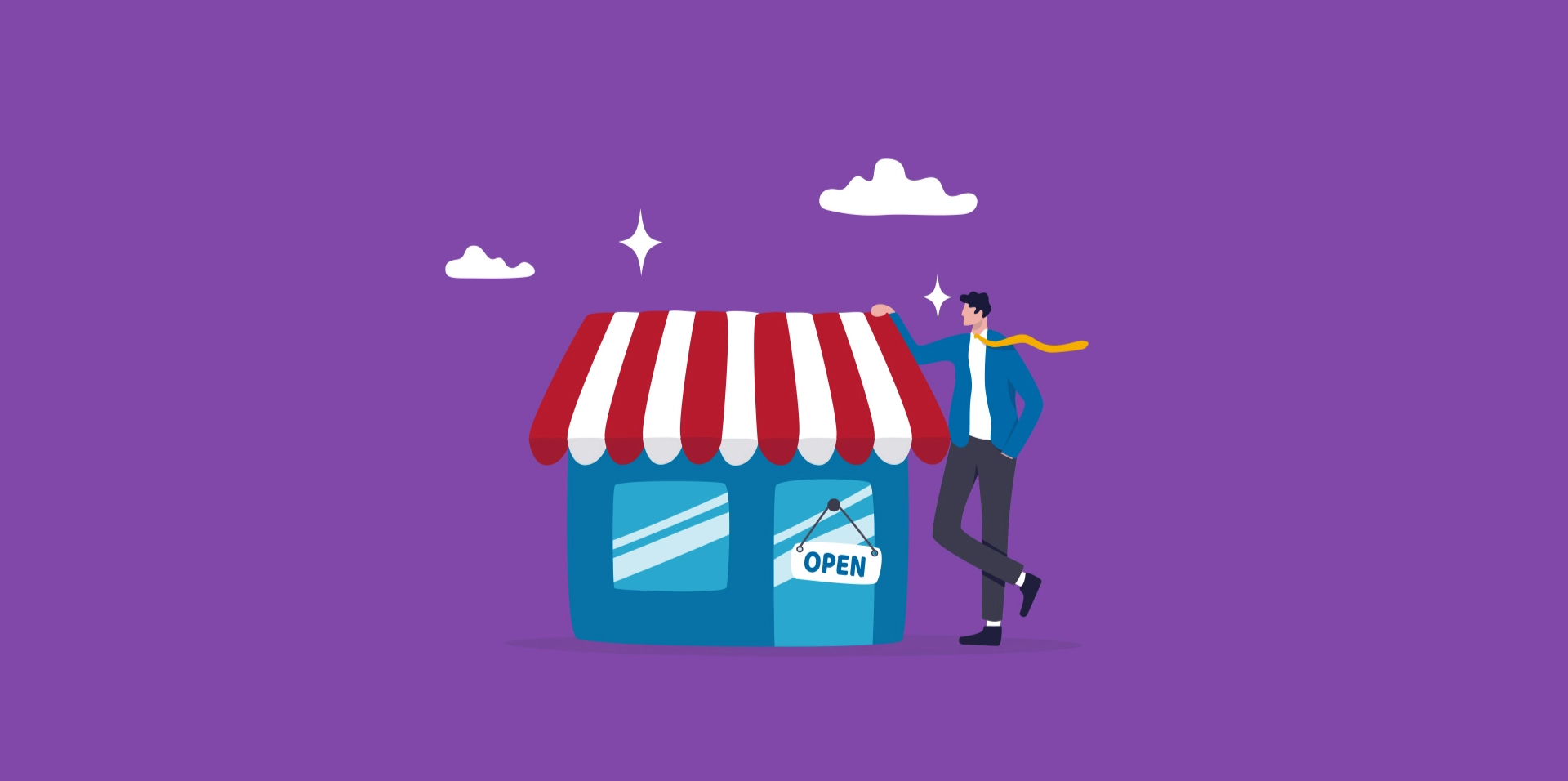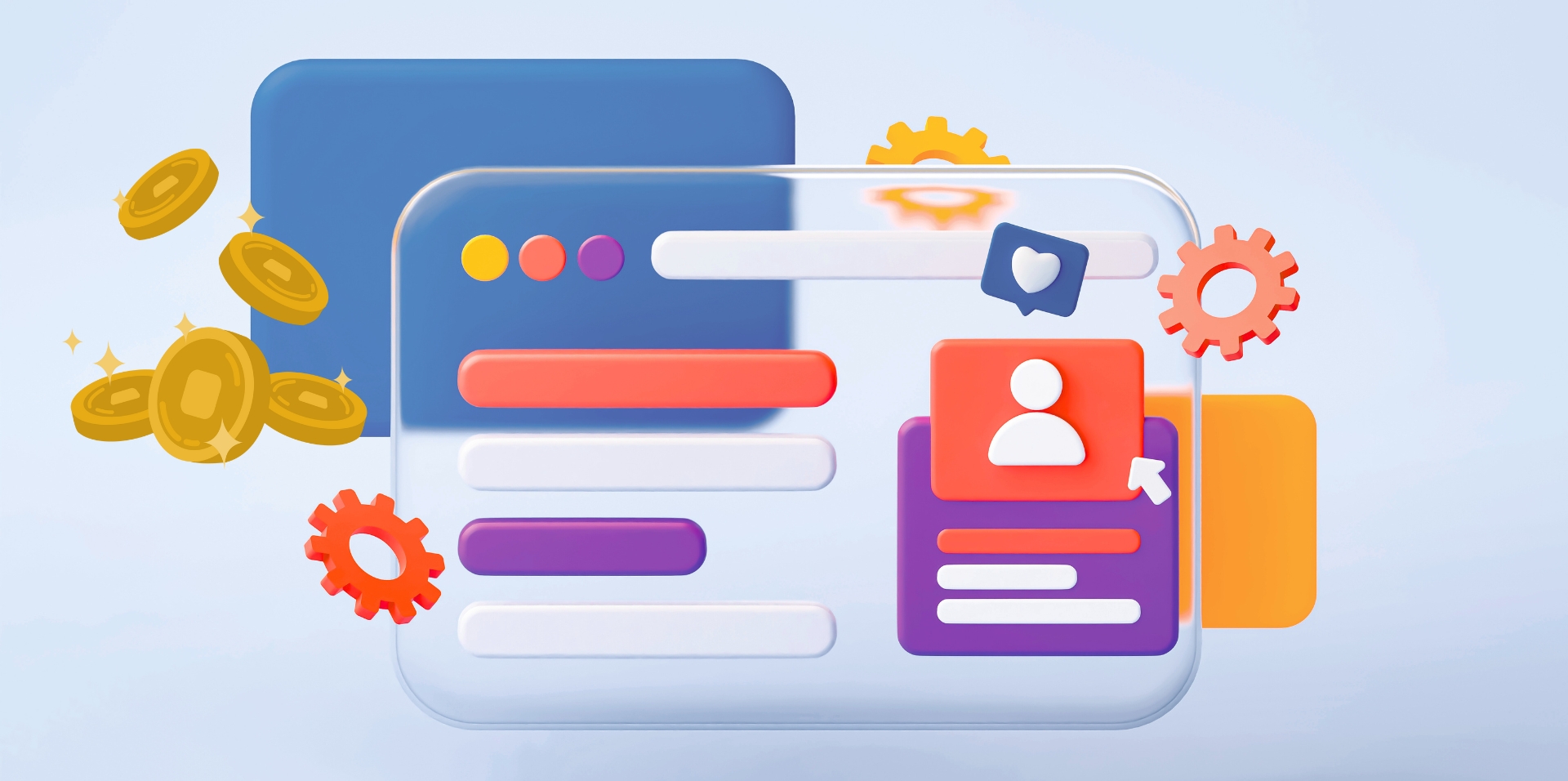As the new year approaches, it’s an ideal time to take a moment to work on your online business. Think about the strategy and focus on growth and improvements in 2022.
You can do no better than starting your considerations with the online presence. Even before the onset of Covid-19, which made having an online presence hyper important; having a strong, well designed, intuitive and easy to use website is an absolute must for any business in any sector. Here we discuss and demonstrate the reasons why you should take time to look at how to move online and grow your business in 2022!
If you need help with improving your online presence in 2022, give our team a call on 01403 261491. We’d love to help you to get your business online and improve your digital offering.
Why is having an online presence important?
A website gives you a platform that enables you to establish your company’s credibility and build trust with any potential customers. This is especially useful for small businesses who are looking to sell online and bring in clientele beyond local customers, broadening their reach as a company. Many small businesses will use a Facebook business page or other mediums like an Etsy store, none of these platforms will allow you the control and freedom you could get over your own online storefront. They are important platforms themselves and can be utilised to drive traffic, but your own site should be the first focus.
Consumers will opt to research online to find companies that best suit their needs, this is especially true during the current pandemic where even more customers will flock to the internet in the hopes of finding the right company for them. With this rise in online spending, having a business website is vital in securing customers. Read our tips for success.
Getting your website online
The following is a list of actions you will need to take in order to get your business online. Alternatively, it can be used as a good guideline for those who already possess websites and wish to grow their audience further.
Plan your website
Having a base plan for your website will help during its development and will enable you to easily make decisions as you go.
Here are some things to consider in the initial planning stage for your new website:
- Decide what the purpose of your website will be. Whether it be to sell online, to get form submissions or phone calls, or to be purely informational. It is important that you decide on a direct purpose for your website during the planning stages as this will be essential to ensure it is a success.
- What sort of information do you need to provide? It is vital that your website contains all the relevant information to suit your business, in order to direct and inform potential customers. Start by reviewing competitors sites and list the pages and information that they provide which would be beneficial to your customers.
- What would you like your website to do? Will it be mainly informational to draw the attention of visitors to your business or will it be an online shop that needs e-commerce functions for sales? Informing your web developer of the functionality before the site goes into build is essential to ensure there aren’t any additional unbudgeted costs.
- What sort of budget do you have for this website – both monetary and time? It’s important to set aside a reasonable budget to spend on the site and to consider how much time you have to dedicate to the process. Is it a small business website? – Can you afford to use a professional website designer or will you be forced to use a DIY website builder? Can you create content yourself, or is it best to use a good copywriter to work with to aid you?
- Look at your competitors and establish what you do and don’t like. Looking at other websites can provide you with a great outline for your own website’s design and functionality. Make lists of what areas you like and dislike of competitor websites and use them as a guide to spot opportunities to take your own site to the next level.
Register your domain and choose a reliable host
Each website has a domain name, this is the address where your site will be located and users can type it into a browser to find you such as www.britweb.co.uk. Your domain name is highly important and must represent your business as much as possible. Finding something unique and easy to remember and close to your business name is key.
If your business is based in the UK, a co.uk is ideal and it’s often worth checking if the same domain is available as a .com and point them to the same site. This stops competition from potentially registering a similar domain. Also, consider purchasing miss spelt domains and redirecting them to your main domain if spelling your business name incorrectly is a common problem for your customers.
Choose a CMS
Deciding which platform will work for your business is part of the process. Most people choose to use a user-friendly CMS platform such as WordPress as its templated system, plugins and intuitive back end allow business owners to directly edit and manage their pages and content. However, there are many other platforms available, such as Magento, BigCommerce and Shopify for large e-commerce sites. If you’re unsure which one is suitable for your business, we’d be happy to discuss your options.
Create content for your website
One of the main and most important steps during website building is writing the relevant content. You will need all the pages listed to get your website up and running:
Home page
This is the first page most visitors will land on when accessing your website. It needs to be engaging in order to entice visitors, but also include all the vital information about your business and allow them to navigate through the site easily. The home page should include CTA (Calls To Action) to direct your users to the pages and goals you wish them to visit and complete.
Product/service pages
Whether your business is selling products or providing services, these pages must provide all the necessary information that customers will need to know. If the site utilises e-commerce, these pages will need to provide important information which answers customers questions such as sizes, materials used, shipping and returns and contact information to give customers all the information required to qualify the purchase.
About us page
An about us page should include your company’s story, to enable the customers to get to know your company and its values and history. This should also include information about you and your team. People like to read about the people in a business and this page can help to demonstrate character and any history around your brand.
Contact page
A contact page is vital to enable website visitors to get in touch with you, provide several ways to do this, such as a contact form, an email address and phone number as most people have a preferred way of contacting businesses.
Blog page
A blog page can be a good way to give updates about your business while also maintaining the interest of your potential customers. It is essential to create fresh content for SEO purposes and users like up to date information too, so keep this updated regularly and with unique, engaging content.
Designing, building and launching your website
Once you have planned your site, purchased the domain and decided which pages and content are required it’s time for the fun bit!
Designing your website
Designing your website with your customers in mind is essential for its success. First impressions count, so creating a website that is aesthetically pleasing, easy to navigate and works well on a multitude of devices and browsers will ensure that it has good foundations for growth.
Building your website
Once the design is finalised, it’s time for the build. This process includes implementing your design, adding pages, content, functionality, and if e-commerce – payment providers. The website should be built with mobile-first in mind, be responsive to allow for other browsers, devices and users and be easy for people to use and navigate.
It’s essential to get people to review the site and raise any issues that they find. Ironing out any snags before launch is key to its success.
Launching your website
Once you’re happy with the look and feel of the site, it works as it should and all the content, forms, products and services have been added; you’re ready for launch.
This is an amazing milestone and should be celebrated! But the fun isn’t over, the next steps discuss how to build traffic to your website to ensure is new, and continued success.
Build traffic to your website
Once your website is live, you’ll want to market it and build relevant traffic to the site. There are many different ways in which people can enter your site; traffic sources include direct, organic search (SEO), paid search (PPC), social media, email marketing and referrals.
Each of these online marketing efforts will bear its own significance in your online business and will enable you to drive traffic to your website and gain new customers, ensuring that your business grows.
SEO

Search Engine Optimisation (SEO – the process of gaining higher search engine rankings) can be one of the most successful ways to drive traffic to your website. Ask yourself, if I’m looking for something – what is the first thing I do? The answer is usually Google it! (Or Bing or any other search engine of your choosing!)
SEO helps to increase traffic to a website and webpage by improving its visibility in organic search engine results pages. As one of the most essential online marketing tools, if done correctly, it can have an amazing impact on the performance of your site. However, be aware that this is a long term strategy and your success can depend on many factors such as the competitiveness of your business, search volume around the terms you are trying to rank for and search engine algorithm updates.
PPC
PPC (Pay Per Click – a form of online ads) is a great medium for quicker success. SEO takes time to develop, whereas, well written, engaging PPC ads backed by a realistic and well tailored budget can give you instant success. It can become expensive as it is literally ‘Pay Per Click’, but with advertising on search engines becoming ever more dominant, it’s a key part of any digital marketing strategy.
Social media
Having a social media presence is vital in aiding any small business online. It can help drive traffic to a website and builds trust with customers; getting the word out about the business. All successful businesses will have a well maintained social media presence.
Using social media can be relatively inexpensive and comes with the option to set up sponsored ads, allowing you to reach your target market and drive them towards your web pages. Furthermore, social media is a great opportunity for you to engage with your customers and increase awareness of your brand.
There are a variety of social media platforms available for your business, such as Facebook, Instagram, LinkedIn, TikTok or Twitter, just to name a few. Each platform has its own audience, taking advantage of this will enable you to easily reach your target audience. Consider your sector and which of the key social media accounts will work best for your business and concentrate on those first.
Email marketing
Many businesses will use email marketing to send out relevant information to their already engaged database. It can also be a great way to send any business updates to existing customers and to keep them engaged. Use it to promote new products, discounts or request feedback on industry trends.
Start by giving website visitors the option to leave their email address for a newsletter, or when they contact you through a form submission. It enables you to establish a relationship with the client while also being an easy and cheap method of marketing to those who have already expressed an interest.
Convert your customers
Now that your website has traffic, you need to be able to convert your website visitors to invest in your business. Think back to your base plan, what is it you want them to do?
It is important that your website is equipped to convert visitors whether it be an online store that needs to gain paying customers, or an informational website that needs form submissions.
Make sure that the website is as easy to use as possible. Use data to review the success rate of your conversion pages and make changes accordingly – do you have a required field that is putting people off submitting a form, or a lengthy checkout that is causing people to abandon their basket? Make changes to convert your customers.
Taking your website to the next level
Ongoing marketing for your website
It is important to remember that the website’s success is a continuous project that will need regular attention to improve its performance. Review the types of traffic sources that drive traffic to your website, make changes to the site to convert them and add useful information to keep the site fresh and relevant.
Get in touch
Specialising in web design and development, e-commerce, SEO and digital marketing, our team is able to help you optimise your business online. Contact us for any enquiries you may have in launching your online business.


